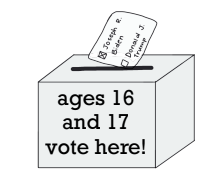Voting Age Should be Dropped for the Midterms
On November 8, 2022, Americans will vote on who they want to represent them in the Senate and House of Representatives. The Senate is responsible for creating bills, amendments, and resolutions, and simultaneously voting to pass them.
Lots of the issues voted on in Congress affect young people, and yet, young people are not allowed to vote on them. Young people, specifically minors of sixteen and older, should be allowed to vote in the midterm elections because their brains are developed enough to be able to make rational decisions when voting. They should also be able to elect representatives into office who will pass legislation that will benefit teens. If teenagers over sixteen years of age are allowed to vote, it would lead to an increase in voter turnout, and lifelong habits being formed.
Right now, according to FairVote.org, only about 40% of Americans vote in the midterms elections. Not enough Americans are voting and if we lower the voting age to sixteen, there will be more turnout. Several countries have tested this theory. For example, in Norway in 2011, officials lowered the voting age to allow 16 and 17 year olds to participate. The result? 58% of 16 and 17 year olds showed up to vote. According to Vox, this was more than the 45% of voters aged 18 to 21 who showed up to vote that same year. From this, we can see that if we lower the voting age, teenagers will feel the need to vote and show up to the polls.
Furthermore, studies have shown that the section of the brain called the cold cognition, the part of the brain that is used when voting, is almost fully mature by the time a child turns 16. A professor at the University of Minnesota confirmed this when he tested people of varying ages on their cold cognition thinking skills. He found that students who are at least 16 have their cold cognition part of their brain near fully developed. Student voters will be able to make well thought out decisions when choosing who they want to represent them in government.
Finally, if allowed to vote at 16, lifelong voting habits are established. When teenagers live at home they are regulated by their parents or guardians. Teenagers will vote in elections because their parents want them to. This will help to establish a voting habitat because research shows that if you vote in one election, you are 25% more likely to vote in the next election.
It is time for teens to have a say in the legislation passed. So many of the problems in the world affect them. School shootings are increasing, the global temperature is increasing and teenagers need to be able to vote on representatives that will put legislation in action to help them.
It is time for change. It is time for teenagers to have more of a say in government. Even if not every teen will vote, the teens who wish to see changes in the laws being passed should have the ability for their voices to be heard.
Hello there! Our goal is to provide relavent, engaging journalism for readers of all ages. Your donation will support the student journalists of the Wolfpacket at Claremont High School, and will allow us to purchase equipment, print our monthly issues, and enter in journalism competitions. We appreciate your consideration!

Callum is a Senior at CHS and one of the Head News Editors. Besides the paper, he is also a member of the Speech and Debate team, works as a lifeguard,...








